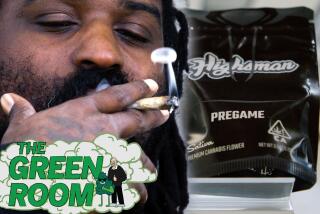Retired Pro Warns Students About Steroids
- Share via
FOUNTAIN VALLEY — Five years ago, when Steve Courson retired from professional football, he discovered that he suffered from a heart condition that he blames on his use of anabolic steroids.
On Thursday, Courson, a bulky former offensive guard and two-time Super Bowl player, told an assembly of 1,200 Fountain Valley High School students that those who use performance-enhancing drugs are risking their health.
“I used steroids,” Courson told the audience in the basketball gym. “I had the worldly vision of success. . . . But if I knew then what I know today, would I use steroids? The answer is no.”
Courson first used steroids in 1974 while playing college football. He gained 30 pounds in 30 days, he said. When he was playing for the Pittsburgh Steelers and Tampa Bay Buccaneers, he used them again. At his peak, he could bench press 605 pounds, he said.
Then, in 1985, he retired from football and found he suffered cardiomyopathy, a weakened heart muscle, and later learned that he needed a heart transplant. He blamed steroids.
In a sport where heft and power make the difference in crucial plays, Courson said he feared losing the edge to linemen who used steroids to build muscle and gain explosive strength.
“It’s business and it’s money,” he said in an interview before the lecture. “You do what you have to do. . . . Do you think I wanted to take that stuff? I did it because it was my job. It’s a war out there.”
Courson told the students that performance-enhancing drugs help athletes train more aggressively, revive more quickly between workouts and build body mass. But they also pose long-term threats to the heart and liver, he said.
Anabolic steroids are synthetic hormones sold as pills or injectable liquids. Courson estimated that one in 15 high school students nationwide use steroids. State law prohibits the use or sale of steroids without a prescription.
Jennifer Schoemann, 17, a senior, objected to the presentation’s inclusion of slides showing steroids-using body builders, which drew expressions of wonder from the audience.
“Showing the guys who were huge only made a lot of the guys (in the audience) want to be like that,” she said. “Rather than have the opposite effect, it just made people wonder what it would be like to be like that.”
But some members of the varsity football team disagreed.
“He tried to gain our confidence by not saying (steroids) don’t work. We know they work,” said Scott Wohrman, 18, a senior. “We wouldn’t have listened to anything else he said” if he had lied about steroids, Wohrman said.
The varsity team’s center, Wohrman said he suspects some of his opponents use steroids but has withstood the temptation to use steroids himself.
“I’ve seen huge guys, and they can’t get that big--unless they were lifting since they were 2-year-olds. These guys are just gigantic for 17-year-olds,” Wohrman said. But “you can’t do anything about it unless you want to risk your health.”
Courson, originally from Pennsylvania, has been on the waiting list for a heart transplant for more than a year, he said. He is touring the country speaking to high school students about his experience with steroids to raise money for his heart transplant, said John L. Lestini, Jr., co-chairman for the Steve Courson Medical Trust Fund.
Charter Hospital of Fountain Valley, which sponsored Courson’s talk, paid $1,500 to a trust fund toward the transplant, Lestini said.
More to Read
Go beyond the scoreboard
Get the latest on L.A.'s teams in the daily Sports Report newsletter.
You may occasionally receive promotional content from the Los Angeles Times.










